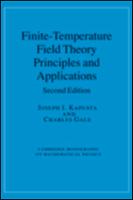Finite-Temperature Field Theory
Principles and Applications, 2nd edition
Author(s)
Kapusta, Joseph I.
Gale, Charles
Collection
SCOAP3 for BooksLanguage
EnglishAbstract
This book develops the basic formalism and theoretical techniques for studying relativistic quantum field theory at high temperature and density. Specific physical theories treated include QED, QCD, electroweak theory, and effective nuclear field theories of hadronic and nuclear matter. Topics covered include: functional integral representation of the partition function, diagrammatic expansions, linear response theory, screening and plasma oscillations, spontaneous symmetry breaking, Goldstone theorem, resummation and hard thermal loops, lattice gauge theory, phase transitions, nucleation theory, quark-gluon plasma, and color superconductivity. Applications to astrophysics and cosmology cover white dwarf and neutron stars, neutrino emissivity, baryon number violation in the early universe, and cosmological phase transitions. Applications to relativistic nucleus-nucleus collisions are also included. The book is written for theorists in elementary particle physics, nuclear physics, astrophysics, and cosmology.
Keywords
quantum statistical mechanics; functional integral representation; the partition function; interactions; diagrammatic techniques; renormalisation; quantum electrodynamics; linear response theory; spontaneous symmetry breaking; quantum chromodynamics; resummation; hard thermal loops; lattice gauge theory; dense nuclear matter; hot hadronic matter; nucleation theory; heavy ion collisions; weak interactions; astrophysics and cosmologyDOI
10.1017/9781009401968ISBN
9781009401968, 9781009401968Publisher
Cambridge University PressPublication date and place
2007Grantor
Classification
Nuclear physics


 Download
Download